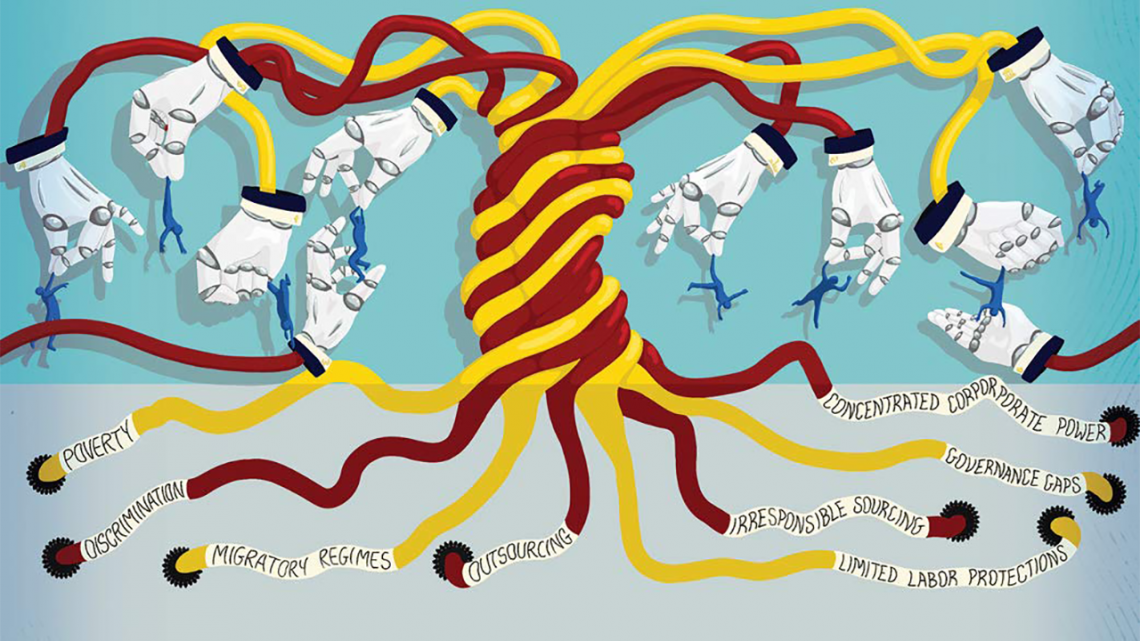
News directly from Cornell's colleges and centers
Codes of conduct for supply chains challenged
By Mary Catt
Professor Sarosh Kuruvilla traces the origins of his newly published book to a 2015 episode of John Oliver’s “Last Week Tonight” on HBO.
Oliver criticized companies such as Forever 21, The Children’s Place, H&M, Walmart and Gap Inc. for failing to improve working conditions in their global supply chains, despite two decades worth of codes of conduct for their supply chains. The show motivated Kuruvilla to investigate those failures and reveal information many companies had not disclosed about their efforts and the outcomes in regulating labor conditions.
He tracked data using multiple sources, including 40,000 audits in more than 12 countries and 13 industries; several global companies also shared their data.
Kuruvilla will review the book's key findings, based on analysis of previously hidden data, and discuss the ineffectiveness of private regulation in global supply chains at 1 p.m. ET Tuesday during a live launch event and debate. The webinar will be co-hosted by ILR’s New Conversations Project and the "Sourcing Journal."
Eddie Hertzman, founder of “Sourcing Journal,” will interview Kuruvilla on what his findings mean for global labor governance in apparel and other sectors including horticulture, home furnishings, furniture, fish, lumber and fair trade coffee.
Published by Cornell University Press in April, “Private Regulation of Labor Standards in Global Supply Chains: Problems, Progress, and Prospects” examines the effectiveness of corporate social responsibility programs on improving labor standards in global supply chains.
“Private regulation has resulted in some uneven improvements, but the rights of workers have not improved, and some of the standards that workers under are very low … in other words, sweatshops continue,” Kuruvilla said.
Kuruvilla said his first step after being inspired to write the book was to create the New Conversations Project to promote “sustainable labor practices in global supply chains.” He assembled a board of individuals from global brands, unions and NGOs. The board also included Cornell students and multi-stakeholder institutions, known as MSIs.
“From the board’s early discussions, we came to realize that what we needed was evidence and new research to understand the lack of progress,” he said in the book’s forward.
“Doing research is easy for an academic, to be sure, but getting data from companies and other actors in the supply chain ecosystem proved to be a major challenge. It took us two years of consistent effort before finally convincing companies, suppliers, auditing firms and multi-stakeholder institutions to share any data. But they did, and this book uses that data to provide the first comprehensive picture of private regulation in action,” said Kuruvilla, the Andrew J. Nathanson Family Professor of Industrial Relations, Asian Studies and Public Affairs at Cornell.
“I wrote this book not solely as a scholarly exercise. I want it to be used by all the actors in the private regulation ecosystem: global companies; suppliers; global and national trade unions; the many NGOs active in this space, the variety of MSIs, such as the Fair Labor Association, the Ethical Trading Initiative, the Fair Wear Foundation; socially responsible investing companies; and, of course, my students. But most of all, I hope the publication of this book will stimulate improvements in private regulation in ways that will help the myriad workers in global supply chains,” Kuruvilla wrote.
Kuruvilla told “Sourcing Journal” that his goal is to get companies to be more transparent about how well their programs are working so the industry can learn and improve practices. “Companies don’t share data, and best practices are not known. So we want to bring the field to a place where best practices are visible, so that everybody can follow them. And one way to make best practices visible is for companies to analyze their programs and tell us what works and what doesn’t work. And that they don’t do.”
This story also appears on the ILR website.
Mary Catt is the ILR School’s communications director.
Media Contact
Get Cornell news delivered right to your inbox.
Subscribe
